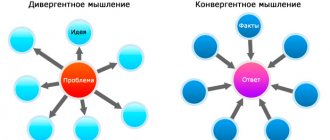It is very important to learn to think logically - such skills help not only to calculate your actions in advance, but also to quickly find a way out of unforeseen situations. A person who has developed logical thinking will undoubtedly be able to achieve success even under not the most favorable circumstances. So, how to develop logical thinking?
Logic and logical thinking
Logic is
The concept of “logic” has its roots in the ancient Greek language, and is translated as thought (reasoning). In general, logic can be called the ability to think intelligently, and it can be considered as a science. We are talking about a branch of philosophy that studies intellectual activity. If you are capable of logical thinking, then based on the data you have, you will be able to come to the right conclusion. With the help of logic, you gain not only general knowledge about a particular subject, but also comprehend its nuances.
What is logical thinking and its types
It is worth noting that logical thinking is divided into several types, and by familiarizing yourself with their characteristics, you will be able to determine whether you possess any of them. In general, logical thinking is a thought process in which we arrive at a valid conclusion from existing premises.
Verbal and logical thinking
It uses logical constructs and concepts, acts based on linguistic means and represents the highest stage in the development of thinking. Using verbal and logical thinking, a person is able to come to general patterns and generalize various visual materials.
The formation of such thinking occurs gradually. During training, a person masters the methods of mental activity and analyzes the process of his own thoughts. When solving educational problems, it influences the formation of analysis, generalization, synthesis, classification, comparison. Let's look at these concepts in more detail.
Analysis is a mental operation in which a person is able to disassemble a complex object into elements.
Synthesis - usually acts in unity with analysis, carried out simultaneously. A person moves from parts to the whole.
Generalization is the combination of many elements according to a single characteristic. The comparison reveals something in common.
Classification - objects are grouped according to essential characteristics
Comparison is a comparison of phenomena and objects, as well as identifying their differences and common features.
Verbal-logical thinking
People who have this type of thinking tend to focus their attention on what they say rather than how they say it. Such logicians have a predisposition to accuracy and show interest in the semantic essence of any information. They try to compare newly acquired knowledge with those they already possessed.
It is worth noting that this type of thinking, alas, is not characterized by fast memory. A person needs a certain amount of time to carefully think and analyze everything. We also note that people with this type of thinking are prone to conservatism and weak expression of emotions.
The strengths of verbal-logical thinking include accuracy and consistency. The negative side is slow switching from one task to another.
Mathematical thinking
This type of thinking is characterized by flexibility, originality and depth. Let us consider these concepts in more detail, in the context of mathematical thinking.
Flexibility is the ability to vary options for solving a certain problem, easy transition from one way of solving a problem to another. We are also talking about the ability to leave the boundaries of familiar methods of action - a person is looking for new solutions, quickly adapting to changed conditions.
Originality is a factor that provides the highest level of unconventional thinking in this case.
Depth is the ability to comprehend the essence of all the facts being studied, their relationships, hidden features.
Associative-figurative thinking
It should also be noted that there are people who are characterized by associative-figurative thinking. Their memory is well developed, but differs from the memory of logicians. Trying to remember something, the lyricist immediately reproduces something else in his memory because he has a predisposition to associative perception of reality.
What are the main benefits of thinking like this? You can give examples of emotionality, rich imagination, and the ability to easily switch from one to another. A person perceives images holistically, connecting them with existing reality.
Disadvantages include inconsistent actions, increased idealization, excessive vulnerability, and increased sensuality. Such features do not always make it possible to look at the world objectively, although they make it very exciting.
What is thinking
Human thinking is the main achievement of millions of years of evolution. The world as we see it now is the result of the mental activity of the most outstanding representatives of Homo Sapiens.
In the broadest sense of the word, thinking is the process of processing information by the mind on the basis of a person’s existing knowledge and accumulated experience. As a result of this process, the initial information is analyzed, systematized, classified and acquires a new quality.
Why do you need to develop your thinking? The better it is developed in a person, the more effectively he interacts with the environment, other people, and in general, the more successful he is in life.
Thinking begins to form in early childhood and goes through several stages in its development. Scientists have found that the development of thinking of an individual person repeats the development of thinking of all humanity.
First, we learn to interact with specific objects, highlight their main properties and characteristics, and then we begin to operate with abstract images and concepts in our minds.
Intensive development of thinking occurs until about 20 years of age, then it slows down and can completely disappear if it is not consciously dealt with.
Why does a person need to develop logic and memory?
Developed memory and logical thinking are simply necessary in everyday life - when performing professional tasks, as well as in everyday affairs.
By developing memory and logic, you will learn to concentrate your attention and control your thoughts. As a result, it will be easier for you to focus on current tasks and organize your own life.
By performing exercises to develop memory, after a certain period of time you will begin to notice that when solving problems, you use very non-standard and effective methods that would not have occurred to you before.
Mental operations
To give you an idea of what a multifaceted and complex process our thinking is, I will list some of its capabilities. Even the most powerful computer next to it will seem like a child's toy.
- Comparison – highlighting the similarities and differences of several objects. “The shape of an apple is similar to a peach, and the color of a pear.”
- Analysis is the division of objects into their component parts. “A chair consists of legs, a seat and a back.”
- Synthesis is the joining together of disparate elements. “Stick, stick, cucumber - so the little man came out.”
- Induction is the derivation of inference from the particular to the general. Distribution of knowledge about one object to a group of similar ones. “This dog chews a bone, so dogs can chew bones.”
- Deduction is the opposite of induction. Endowing an object with specific properties based on its membership in a group. “Ants can lift objects heavier than their own weight. So this particular ant can lift more than its own weight.”
- Combination – searching for solutions to a problem based on a combination of different methods. Underlies combinatorial thinking. Used, for example, when playing chess.
- Divergence is the search for multiple solutions to one problem. We use divergent thinking during brainstorming.
- Convergence is the search for the only correct solution based on learned algorithms. It is used when solving problems in which there can be only one correct answer and it can be obtained only in one way.
This is not all the capabilities of our brain. If you want to learn more, I advise you to read special books on thinking development. We will look at some of them towards the end of the article.
How to develop memory and thinking in adults
Tasks for the development of logical thinking
On the Internet you can easily find a variety of tasks with the help of which you will be able to develop logical thinking. Many sites will offer you different levels of tasks. Try to start with something not too difficult and gradually move on.
Learn to think logically through games, puzzles and strategies
Also, a variety of games, strategies and puzzles can greatly contribute to the development of logical thinking. To do this, it is not necessary to search for tasks on the Internet. Even by purchasing a box of puzzles, you can not only have an entertaining evening, but also significantly improve your level of logical thinking.
10 ways to develop your memory
1.) Read a lot of books
Of course, a person who is inclined to read has a better memory than one who does not show any interest in this activity. So how can this be used. Read a short story, then immediately retell it into the recorder. After a few hours, try repeating this retelling. Analyze what details you forgot, what you missed. Do these exercises regularly.
2.) Pronounce words backwards
This is also a very useful method to improve your memory. It is also impossible not to note the convenience of this method - you do not need a voice recorder or other auxiliary devices. Perform this task before going to bed, on the road, in line, and so on. If possible, you can do the exercise on a piece of paper, in a notepad - this way it will be more convenient for you to test yourself.
3.) Study poetry and new words
Memorizing poetry is a wonderful memory trainer. You can also learn new words that are unfamiliar to you. As soon as such a word catches your eye, at any opportunity, look up its meaning in the dictionary. After this, try “in your head” to compose several sentences in which the new word will be used.
4.) Remember everything in detail, analyze
Get into the habit of replaying in your memory every evening the events that happened to you over the past day. Start from the moment you wake up. Remember what you thought about when you woke up, what you ate for breakfast, who you talked to. Next, move on to memories of how your day went, what people you interacted with, what tasks you faced. Then move on to memories of the evening. Analyze what unpleasant events you could have avoided, what useful things you learned today, what action was senseless, and so on.
5.) Draw images in your head
Quite an interesting exercise that perfectly develops the imagination. For example, imagine yourself on vacation. Let's say, not just you sitting on the shore, but in more detail. Imagine that you are sitting on the warm sand, you have a glass of lemonade or beer in your hand, and there is a plate of shrimp or corn next to you - you can hear their smells. You also hear the sound of sea waves, and sometimes their splashes reach you. You can add any more details.
So, imagine whatever you want. For example, you find yourself in a summer garden: the shadow of the trees falls on you, you hear the smell of raspberries, and pear fruits periodically fall to the ground. The sun's rays break through the foliage.
6.) Get a good night's sleep
Undoubtedly, you have already heard that adequate sleep has an important effect on our memory. If you sleep at least seven hours a night, you can be sure that this has the best effect not only on memory, but also on concentration and even on the rejuvenation of body cells. Good sleep is essential for energy and overall health.
7.) Aivazovsky’s method develops photographic memory
This training technique got its name in honor of the famous artist. While writing his works and paintings, Ivan Konstantinovich mentally tried to stop the movement of the wave and transfer it to his painting so that it would not look frozen.
Aivazovsky devoted many hours to the process of observing water. At the same time, he closed his eyes from time to time, trying to reproduce what he saw in his memory.
How to use this technique?
- Study an object or landscape for 5 minutes.
- Covering your eyelids, try to reproduce the image of this picture in your memory. It is also important that it be colored.
- The effectiveness of training can be increased by fixing objects on a piece of paper.
- If you perform this exercise regularly, you will be able to achieve considerable progress in the development of visual memory.
8.) Schulte tables
Such tables are used to determine the degree of attention, which in turn is directly related to memory - you can find them in abundance on the Internet. To do this, just search for “Schulte tables online” and start training.
Note that we are talking about a field divided into squares, and in those, in turn, numbers from 1 to 25 are written in random order. Subsequently, you will need to find all the numbers in order using a stopwatch - the search speed should increase over time.
9.) Fortified healthy foods
Of course, for good memory it is important to eat food that is as rich in vitamins as possible. Which products should you pay the most attention to? Eat apples, salmon, blueberries, spinach, various seeds and nuts, and grapes.
10.) Develop your left hand if you are right-handed and vice versa
A very useful activity. Set yourself challenging goals. Train your left hand if you are left-handed, and your right hand if you are right-handed. Using your “unaccustomed” hand will be difficult at first, but over time you will master this skill.
Universal recommendations for developing thinking
Let's move on from theory to practice. Follow our guidelines to sharpen your mind and make it razor sharp.
Read more
Nothing contributes to the development of mental activity more than reading. Just be careful - not all literature is equally useful. Pulp novels, second-rate detective stories, memoirs of pop stars only clog the brain.
I advise you to read classical literature, encyclopedias, books on philosophy and psychology. The process of reading itself activates various parts of the brain, and the information that we draw from books expands our conceptual apparatus.
Use your left hand
We all know that the left hand is connected to the right hemisphere, and the right hand to the left. Most of us are right-handed, so our right hemisphere is much less developed. But it is precisely this that is responsible for creative and imaginative thinking. To bridge the gap between the two halves of the brain, you need to start using your left hand as often as possible (for left-handers, the right).
Here are some ideas of what you can do with your left hand without compromising the result:
- brush your teeth;
- open the door with a key;
- eat with a spoon;
- type a message on your phone;
- paint.
At first it will be unusual and the actions will take longer. But then you will get used to it and feel the effect. Thinking will become more flexible, livelier and brighter.
Keep a diary
The habit of recording your thoughts on paper is very useful for the development of thinking. You learn to think analytically, systematize information, highlight the main thing, cut off the unnecessary. Abstract reasoning on abstract topics is of particular value: about the processes taking place in the world, about your attitude towards them, about general philosophical concepts.
Using these records, you can then track the evolution of your thinking. Your first written down thoughts will seem childish and naive to you. As you move through the pages of your diary, your thoughts will develop with you and become slimmer and deeper.
Communicate with those who are smarter
The environment greatly influences a person. It’s not for nothing that they say: “Whoever you mess with, that’s how you’ll gain.” Often people avoid communicating with those who are better than them in some way, for fear of lowering their self-esteem. But if you really want to achieve results, you will have to go through this stress.
Surround yourself with people who are passionate, versatile, and who love to think and reason. The difference in thinking abilities will spur you to develop.
But communication with slackers and whiners, on the contrary, will have to be reduced. Otherwise, you won’t even notice how they will drag you into their swamp called the “comfort zone.” And there is nothing there except the prospect of being firmly attached to the sofa.
Play mind games
Today, collective intellectual games are at the peak of popularity. In every major city you can find a club for fans of “What? Where? When?”, “Brain Ring” and all kinds of quizzes. Join them and you will kill two birds with one stone.
Firstly, such games are great for developing logic. Most of the questions there are written in such a way that anyone can come up with the answer, regardless of their level of knowledge. You will train your mind in a fun and playful way, and bright emotions and excitement will make the training several times more effective.
Secondly, you will meet interesting, enthusiastic, thoughtful people. This is exactly what we talked about a little earlier. A useful and fun pastime can later develop into a strong friendship.
Solve crosswords and puzzles
Buy a crossword puzzle magazine and try to carry it with you everywhere. Guess them as soon as the opportunity arises. For example, in line at a bank or in a hospital. This is much more useful than wasting time fiddling with your phone.
Don't look for easy ways
Sometimes it’s useful to give your brain a jolt by creating artificial stressful situations. In such conditions, development occurs faster and more intensely. Try to arrive in an unfamiliar area and navigate there only using a map, without asking random passers-by for directions.
The same can be done if you are going to another city or country. Even a banal trip to the shopping center can be used for good. Do not ask consultants for help in finding the product you are interested in, try to navigate yourself.
Train your memory
Memory and thinking are interconnected processes. It is memory that determines how quickly you think and how often you make mistakes. Therefore, be sure to pay special attention to this cognitive function.
As a workout, you can learn poetry, memorize shopping and to-do lists. You can go further and enroll in memory development courses. This way you will achieve the desired effect faster and will not give up classes after two days.
How to develop logic and thinking in a teenager
Tasks, puzzles and charades
On the Internet you can find many puzzles that you and your teenager can try to solve. Try to look for tasks that contain the correct answer - if the goal is not achieved, you can see how it could have been achieved.
A special application with tasks for a smartphone
On Google Play you can easily find an application called “Logic, Problems, Puzzles” - it can be installed on your smartphone. The essence of the application is to develop analytical skills in adults and adolescents. There are also apps like Brain Training, Lumosity and many others.
"Stereograms"
Stereo pictures are an interesting phenomenon that arose at the intersection of optics, physiology and psychology. They are good for eye training. The essence of stereo pictures: move the stereogram to a half-arm's length, defocus (relax) your gaze and look through the picture, as if it were transparent or did not exist at all. At first, your eyes will unconsciously switch to the picture, but this is natural. After a short time (from a few seconds to a couple of minutes), a three-dimensional image should appear. Over time it will become easier and the picture will be clearer. There is no need to strain your eyes when viewing a stereogram! (application 
In conclusion, I would like to say that in fact, thinking games are a really very useful thing, and if you practice every day for at least 30-40 minutes, you will very soon notice that your mind has become sharper, you have begun to see more unusual things around you, and the thinking process itself has changed – it has begun to bring more pleasure and positive emotions.
How to develop ingenuity and intelligence
Many factors influence intelligence and ingenuity. If you are forced to subject your body to constant stress, then it is not surprising that your reactions will leave much to be desired. During peak periods, the human body produces cortisol, which has a detrimental effect on brain cells. If you have to take on a ton of things in the morning, then you should try to slow down your usual pace of life at least a little. Start by not jumping out of bed immediately after the alarm clock rings - allow yourself some time (15-25 minutes) to lie down and think about the coming day.
Ways to improve your intelligence
Music.
Periodically take a break from the daily hustle and bustle by listening to music. By the way, scientists believe that classical works are very useful for activating the brain. For example, people who listen to Mozart from time to time are characterized by increased speed of thinking.
Don't waste energy.
Don't take on many tasks at once. To do something well, it is important to focus on it. If you have to answer a letter, talk on the phone and listen to the news at the same time, then, of course, attention will begin to dissipate among several sources of information. The result will be a decrease in concentration and even the level of intelligence.
More positive.
Do not deny yourself positive emotions - your performance directly depends on them. Visit parks more often, go to the movies, meet friends.
Development.
Regularly search the Internet for exercises to develop memory and enrich your vocabulary. It is unlikely that you will be “illuminated” by unexpected solutions if you have a poor vocabulary that is almost unable to hold anything in your head. To develop memory, learn poetry, just read books.
Useful literature
Remember the first point of our recommendations for developing thinking? The one that talked about reading. It's time to bring it to life. I’m sharing with you three of my favorite books on thinking development:
- “Lateral thinking. Textbook” Edward de Bono. The book by a world-famous psychologist is dedicated to the development of creative, out-of-the-box thinking. The author is confident that this type of thinking is the future. Considering that in schools and institutes creative thinking is not taught at all, a person who has developed it to a high level will have a serious competitive advantage. In the book you will find many different exercises that will teach you to think outside the box and in an original way.
- “Brain Accelerators” Richard Nisbett. This book will teach you how to apply methods and techniques from various sciences in order to think more effectively and efficiently. You will learn why logical and mathematical laws do not apply to all situations and how to avoid common mistakes in drawing conclusions. The book is serious and may seem difficult to some, but this is its main value.
- "Thinking. System research” Andrey Kurpatov. Perhaps the most voluminous, deep and unexpected book dedicated to thinking. After reading it, you will know everything about thinking. There are no exercises or tasks in it, but there is a lot of information to comprehend.
Books that develop logical thinking
“Applied Logic” by N. Nepeyvod
This book can be considered a simple introduction to the world of modern mathematical logic. The textbook was recommended by the State Committee of the Russian Federation for Higher Education, and has become an excellent source of knowledge for many students of higher educational institutions.
“Textbook of Logic” G. Chelpanov
This is a book that clearly explains the basics of logic. The main emphasis is on syllogistics. The textbook contains tasks with the help of which the student is able to learn to apply certain rules in practice in a short period of time.
“Logic” A. Ivin
A textbook that talks about how to learn to think logically - who finds it difficult, and who easily overcomes barriers. Contains useful tasks.
Argue!
Can you always prove an opinion by choosing the right arguments? Has it ever happened that you couldn’t explain why the movie you suggest watching is better than your friends’ version? The ability to prove your position is not only useful and profitable (if we are talking about bargaining or arguing for a salary increase), but also develops logic. When choosing arguments, you analyze causes and consequences.
There is no need to constantly run into arguments in everyday situations. Go to a lecture, a master class, a lovers-of-anything club and participate in heated discussions. Try to prove random theses mentally or out loud, in a friendly company. For example, argue that Deadpool 2 is an intelligent movie. For training. Participate in rap battles and argue with people on the Internet, after all.
Ten-minute exercises for developing logic for every day
A couple of random words
Select two words at random from an article or story - just point your finger at the words without thinking about their meaning. Now you need to try to find something in common between the selected words - compare them, find the relationship. Come up with an interesting story that could connect the two concepts.
Associations
Look around the room you are in now. Choose an object in the room - for example, a chair or a plate. Take a piece of paper and come up with five adjectives that best describe the thing you have chosen. Example: round plate, yellow plate, small plate, clean plate, empty plate.
Now write five adjectives that are completely inappropriate for the chosen subject. Example: wooden plate, boiled plate, winter plate, windy plate, silk plate. Undoubtedly, such exercises will benefit you if you do them daily. Plus, you don’t have to spend a lot of time on them! Try to start today, and you will soon notice significant progress in the development of logical thinking and imagination.











